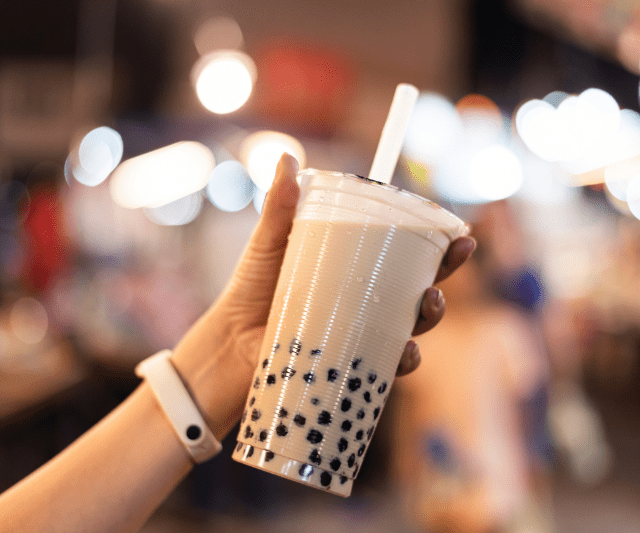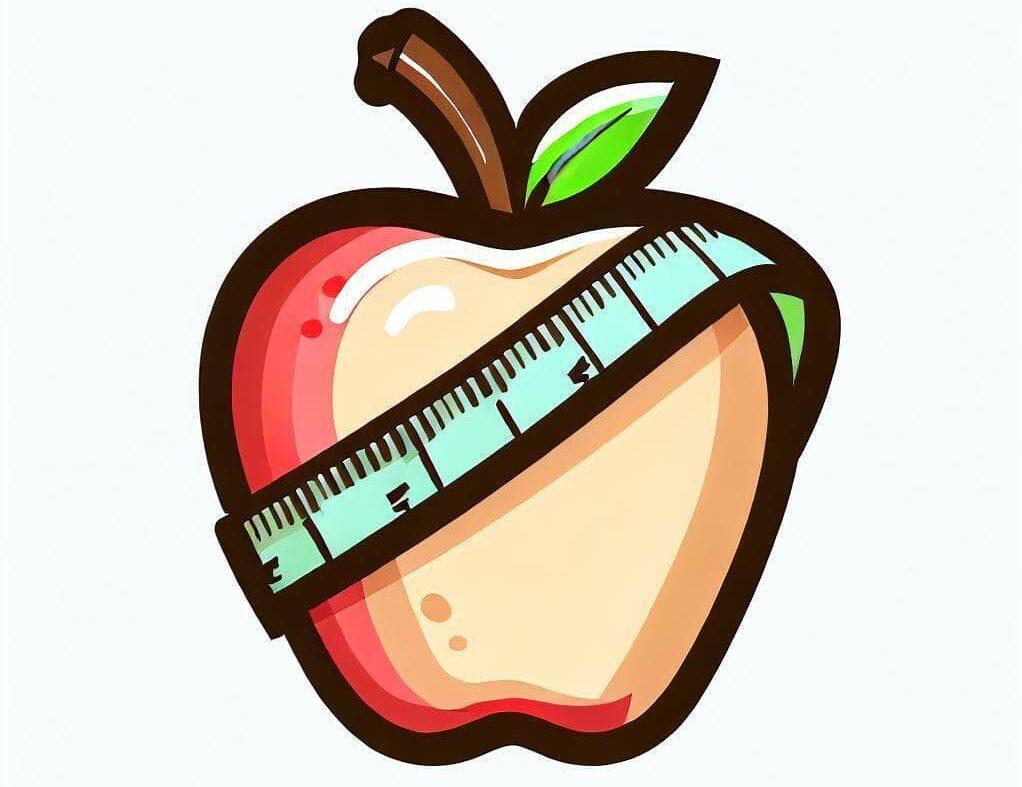Is Bubble Tea Good for Weight Loss?
This post may contain affiliate links which means I may receive a commission for purchases made through links at no extra cost to you. See my disclosure policy for more information.

No, bubble tea isn’t good for weight loss because it’s high in sugar and calories. The main thing in bubble tea is tapioca pearls, which are made from cassava.
The problem is that most bubble teas have a lot of extra syrup and added sugar, which makes them even higher in sugar.
Even though it’s called bubble or boba tea, it’s not like other teas such as chai tea, green tea, or black tea. It’s completely different. It’s almost like a soda or should be seen as a sweet treat, not a regular tea.
So, as a nutritionist professional, I wouldn’t recommend drinking bubble tea every day.
You can surely have it once in a while, but just know that it’s not going to help you with your weight loss goals. In fact, it’s quite the opposite.
If you’re interested in more details about why this drink isn’t good for weight loss, keep reading.
Nutritional Value Of Bubble Tea
The nutrients of a boba drink will vary depending on whether you get it from a grocery store or a restaurant. Below are the nutrients for 1 glass of bubble tea from INO TEA (as per the USDA).
Serving Size: 490 ml
Calories: 274
Carbohydrates: 48 g
Fat: 7 g
Protein: 5 g
Fiber: 0 g
Sugars: 44 g
Sodium: 176 mg
Downsides Of Bubble Tea For Weight Loss
High-Calorie Content
The calorie content in bubble tea mainly comes from its base ingredients – the tea itself, milk or creamer, sweeteners like sugar or syrup, and tapioca pearls.
Tapioca pearls, made from starch, are particularly high in calories.
A standard serving of bubble tea can range from 200 to 450 calories, depending on the ingredients used.
When syrups, sugar, and creamers are added in generous amounts, the calorie count can skyrocket.
For weight loss, maintaining a calorie deficit (consuming fewer calories than you burn) is essential.
Drinking bubble tea regularly, especially with its high-calorie content, can easily push you over your daily calorie limit, hindering weight loss efforts.
Added Sugars
Bubble tea usually has a lot of added sugars. These sugars come from the syrups and sweetened creamers used in it.
In one serving of bubble tea, you might find anywhere from 20 to 60 grams of sugar.
Having too much sugar can lead to weight gain. This happens because sugar is full of calories but doesn’t make you feel full or satisfied.
The reason why foods and drinks with a lot of sugar aren’t good for losing weight is because of the way sugar is made.
Sugar has two parts: glucose and fructose. Your body can use glucose in almost every cell for energy. But fructose is different.
It needs to be changed into glucose before your body can use it. Your liver is the only organ that can turn fructose into glucose.
When you have a drink or food that’s very high in sugar, your liver has to work really hard.
If there’s too much sugar, your liver can’t keep up. It starts turning the extra glucose and fructose into fat. This fat often gets stored around your belly. Over time, this can lead to gaining weight
Low Nutritional Value
Besides a few vitamins and minerals, it really doesn’t offer any big nutritional benefits.
The truth is, the main reason it’s so popular is because it tastes good. And why does it taste good? It’s because of its high sugar content.
So, the thing is, other than making your sweet tooth happy for a little while, it doesn’t offer much else for your health. And it definitely doesn’t help you with your weight loss goals
This can lead to Sugar-Induced Cravings
The high sugar content in bubble tea can cause a rapid spike in blood sugar levels. This is followed by a swift drop, often termed a ‘sugar crash’.
This fluctuation in blood sugar can lead to feelings of hunger, even if you’ve recently consumed enough calories.
Sugar is known to stimulate the same pleasure centers in the brain as certain addictive substances.
When you consume something high in sugar, like bubble tea, your brain releases dopamine, a neurotransmitter associated with pleasure.
This release can create a cycle of craving more sugar for that pleasurable sensation.
Tips For Adding Bubble Tea In a Weight Loss Diet
Time it with Physical Activity
Consuming bubble tea after a strenuous workout can be strategic. Post-exercise, your body is in a recovery mode where it replenishes glycogen (stored energy) and repairs muscle.
The calories from bubble tea, when consumed in moderation, can contribute to this recovery process.
However, it’s important to balance the calorie intake from the bubble tea with the calories burned during the workout.
Consuming a high-calorie drink after a low-intensity workout might offset the calorie deficit achieved through exercise.
Choose a Lower-Calorie Tea Base
Teas like green, black, and oolong tea are known for their metabolism-boosting properties.
They contain antioxidants like catechins and caffeine, which have been linked to increased energy expenditure and fat oxidation.
Cutting out extra sugar or syrup is crucial. The added sugars in bubble tea are a major contributor to its high-calorie count.
If sweetness is desired, opting for natural sweeteners in small amounts is a better option.
These sweeteners should be used sparingly as they can still contribute to overall calorie intake.
Select a Lower-Fat Milk Option
Skim milk, almond milk, and soy milk are lower in calories and fat compared to full-fat dairy or creamers.
Soy milk, in particular, offers a good protein content, which can be beneficial for muscle repair, especially if consumed post-workout.
These milk alternatives can provide essential nutrients. Calcium is vital for bone health, and protein is crucial for muscle repair and satiety.
Choosing these options can help you maintain a balanced diet while enjoying bubble tea.
Opt for Smaller Servings and Limit Frequency
Choosing the smallest size available can significantly reduce the caloric intake of bubble tea.
Since drinks don’t always register the same way as solid food in terms of satiety, smaller portions can help control calorie consumption without feeling deprived.
Limiting bubble tea to once or twice a week can help keep your overall weekly calorie intake in check. Regular consumption of high-calorie beverages can easily tip the balance against weight loss efforts.
Modify or Omit Tapioca Pearls
Replacing tapioca pearls with fruit, jellies, or chia seeds can add nutritional value to the drink.
Fruits can provide vitamins, minerals, and fiber, while chia seeds offer omega-3 fatty acids, fiber, and protein.
Tapioca pearls are primarily carbohydrates with little to no essential nutrients.
By opting for healthier additions, you can enhance the nutritional quality of your bubble tea and make it more aligned with your weight loss goals.
Also Read: Smoothie Vs Milkshake For Weight Loss
Alternatives To Bubble Tea For Weight Loss
Herbal Tea or Infused Water
Proper hydration is crucial for weight loss as it can help control hunger and boost metabolism.
Herbal teas and infused water provide a flavorful way to stay hydrated without adding calories, making them a smart choice for anyone looking to maintain a healthy lifestyle.
By infusing water with fruits or herbs, you can enjoy a sweet and refreshing taste without the need for added sugars, which is beneficial for reducing overall calorie intake.
Green Tea
Green tea is renowned for its many health benefits, including its potential to enhance metabolism and promote fat burning, which are essential for weight loss.
The antioxidants in green tea, particularly catechins, along with caffeine, can aid in increasing energy expenditure.
Besides weight loss benefits, green tea’s high antioxidant content supports overall health, contributing to a healthy lifestyle.
Also Read: Best Time To Drink Green Tea For Weight Loss
Black Coffee
The caffeine in black coffee not only helps in boosting metabolism but also can act as an appetite suppressant, potentially leading to reduced calorie intake.
For those trying to lose weight, black coffee is an excellent, calorie-free choice that fits well into a weight-loss diet.
Coffee can provide a much-needed energy boost for more effective workouts, indirectly supporting weight loss efforts.
Vegetable Juice
Vegetable juice offers a way to consume a high volume of nutrients with minimal calories.
For weight loss, choosing vegetables low in calories and sugars can provide essential vitamins and minerals without compromising calorie goals.
Consuming a variety of vegetables through juicing can support overall health, aligning with a holistic approach to a healthy lifestyle.
Sparkling Water with a Splash of Juice
This alternative provides the fizzy satisfaction of a carbonated drink with a fraction of the calories found in sweetened teas or sodas.
The addition of a small amount of fruit juice adds flavor without significantly increasing the calorie count.
The ability to customize the flavor by choosing different fruit juices allows for variety in your diet, supporting adherence to a long-term healthy lifestyle.
Protein Shakes with Almond Milk
Protein is key for satiety, helping to reduce the likelihood of overeating.
A protein shake made with almond milk can serve as a filling, low-calorie snack, or meal replacement, aiding in weight loss.
Almond milk provides a low-calorie, dairy-free base rich in vitamins and minerals, making it a healthy choice for those looking to lose weight without sacrificing nutritional quality.
Also Read: Is Almond Milk Good For Weight Loss?
Conclusion
So, there you have it: bubble tea isn’t ideal for weight loss due to its high sugar content. Any sweetened tea, whether it’s tapioca tea or iced tea loaded with sugar, won’t aid in weight loss.
A drink that’s friendly to weight loss should contain no more than one teaspoon of sugar at most. Even better if it contains none, like black or green tea.
FAQ
How many calories are in bubble tea?
A typical boba drink can have between 200 to 450 calories, depending on the ingredients used.
Can I drink milk tea during weight loss?
Yes, you can, but opt for versions with lower-fat milk and less or no added sugar to keep the calorie count down.
Is it OK to drink bubble tea once a week?
Yes, enjoying bubble tea once a week, especially if you make healthier choices regarding its ingredients, can fit into a weight loss diet.
Why is bubble tea so high in calories?
Bubble tea is high in calories due to the added sugars, syrups, creamers, and tapioca pearls, all of which are calorie-dense.
This post may contain affiliate links which means I may receive a commission for purchases made through links at no extra cost to you. See my disclosure policy for more information.
Rahul is a professional nutritionist certified by the International Sports Sciences Association (ISSA) and a personal trainer certified through the American Council of Exercise (ACE). He has a special interest in the science of nutrition and how it can impact the body.
